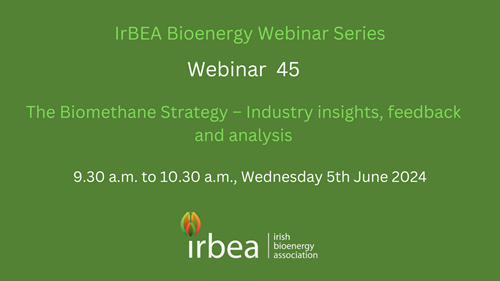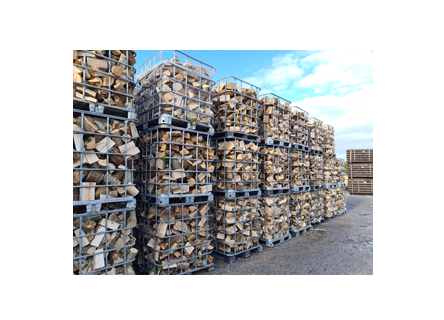Press Release: IrBEA welcomes the biomethane strategy publication but further market certainty is required to attract investment
Irish Bioenergy Association (IrBEA) Press Release
For Immediate Release
29th May 2024
IrBEA welcomes the biomethane strategy publication but further market certainty is required to attract investment.
The Irish Bioenergy Association (IrBEA) as the representative voice of the Irish bioenergy industry and biogas/biomethane sectors welcomes the publication of the biomethane strategy but strongly highlights that further market certainty is required from the Government to provide the necessary conditions to attract investment and ensure the long-term viability and financial sustainability of the biomethane sector.
Seán Finan, IrBEA CEO said “The publication of the biomethane strategy is another step forward in the development of the industry in Ireland. The initial feedback from members on the strategy is that further market certainty will be required to attract investment and to make projects fundable and viable. While capital grants and the renewable heat obligation (RHO) are outlined as mechanisms to stimulate a market for biomethane, further details and long-term certainty will be required on these measures to encourage investment.”
Finan continued “IrBEA members in their response to the initial consultation on the draft strategy indicated their concerns regarding capital grants driving up development costs and favoured an ongoing operational support mechanism. It’s disappointing this has not been considered, explored or referenced in the strategy. Ongoing operational support has been the funding mechanism of choice used in many developing and established European biomethane markets including Denmark which is broadly lauded as a best practice example. Given the cost of feedstock and ongoing feeding requirements of a biomethane system, the fundamental question of AD plant economic viability exists. A capital grant alone or with an obligation will not eliminate this viability challenge.”
The strategy commits to the introduction of a renewable heat obligation (RHO) in the heat sector in 2024 which will incentivise suppliers of fossil fuels used for heat, to ensure a proportion of the energy they supply is renewable. Until the details of this obligation are finalised it is not possible to determine if it will constitute an adequate market stimulant.
Finan commented “We welcome the commitment to introduce the RHO. The RHO introduction has been talked about for years. Why the delay? Why are the main design components not included in the biomethane strategy to give the market confidence that it can deliver. The obligation threshold level, the percentage obligation by 2030, the types of renewable fuels allowed to fulfil the obligation and the buyout rate are all critical components which require particular attention in the design for a successful obligation scheme to deliver. The industry awaits these details to give the certainty that it will deliver as envisaged”.
The biomethane strategy correctly identifies that one of the by-products of anaerobic digestion is digestate, which can serve as an alternative to chemical fertilisers, thus reducing the need for synthetic fertilisers in agriculture.
Finan commented “Digestate presents a considerable opportunity for Ireland. However, the strategy fails to acknowledge in either the text or actions to deliver, the regulatory challenge posed by the Nitrates Directive and the 170kg/N/Hectare limit in replacing inorganic chemical fertiliser with organic digestate despite this issue being flagged in our consultation response on behalf of members.”
Other IrBEA feedback on the biomethane strategy includes:
- The strategy does not identify the strategic risks associated with imported fuels including biomethane (fuel or certificates) or Hydrotreated Vegetable Oil (HVO) and its traceability, as a cheaper drop in fuel, on the development of the Irish biomethane industry.
- Minister Ryan’s statement in his foreword suggests a considerable reduction in gas usage by the mid-2030s, “as we shift our economy away from gas in favour of electrification”. The substantial reduction in dependence is unrealistic given the dependence of the energy system on gas and the need to balance growing intermittent electricity generation by wind and solar with dispatchable generation. Domestic and industrial heating will, through inertia, not deliver the considerable gas dependence reduction suggested with current policy.
- IrBEA welcomes the strategies recognition that different sizes and scales of AD plant will be required in Ireland to deliver the target including a mix of Scenario 1 ‘Widespread Deployment’ (farm scale) and Scenario 3 ‘Economic Deployment’ (large scale).
- IrBEA welcomes the recognition of existing Anaerobic Digestion (AD) plants currently operating to produce biogas and that they will be eligible for capital support to upgrade their facilities to produce biomethane and other biobased products, along with new AD plants.
- IrBEA welcomes the opportunity and potential for biogas transported directly to users and that the Biomethane Implementation Group, GNI and SEAI will determine the best method for certifying this biomethane that is directly transported to end users from biomethane developments.
- IrBEA states that the Biomethane Sustainability Charter must be developed by active and meaningful engagement through meetings and structured dialogue with the industry and not just an online consultation without engagement.
- IrBEA is concerned that the industry or their representatives are not recognised as a stakeholder in any of the measures for delivering the National Biomethane Strategy. How will industry feed into the implementation group, the biomethane charter or any of the other actions? How will the Biomethane Implementation Group interact with industry (plant operators and developers) and IrBEA as their representative body?
Finan concluded “The strategy is another step toward the mobilisation of the biomethane industry. We must move quickly towards implementation to deliver on the ambition and targets set out by the Government.”
ENDS.
For further information contact Seán Finan at seanfinan@irbea.org or 0874146480
Notes to editors
IrBEA Webinar No 45 on the biomethane strategy
The Irish Bioenergy Association will hold webinar No 45 as part of the bioenergy webinar series on Wednesday the 5th of June 2024 at 9:30am. The title of this webinar will be “The Biomethane Strategy – Industry insights, feedback and analysis”
At this webinar, the main elements within the strategy will be outlined and an expert panel will share their industry insights, feedback and analysis on the strategy. The webinar will be hosted by Seán Finan IrBEA CEO who will be joined by a panel of industry experts. Speakers details will be confirmed in the coming days.
Register for the webinar:
https://zoom.us/webinar/register/WN_bRYrJyfLQ5GK87MsDxfGCg








